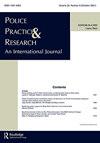重大事件情景模拟中警察学生决策的探索性研究
IF 1.8
Q2 CRIMINOLOGY & PENOLOGY
引用次数: 0
摘要
正确使用武力的决定对警察在重大事件中的表现至关重要。在这项探索性研究中,我们试图更好地理解所涉及的决策过程。86名三年级警察学生在一个视听、关键场景模拟中进行了使用武力的训练演习。参与者回答了关于他们主观决策过程的述职采访。访谈的定性内容分析表明,决策是基于视觉、动态和中心信息,而不是听觉、静态和外围信息。报告了对情境的思考以及对自己的思考。决策策略受专业知识水平的影响。大多数参与者都做出了符合安全考虑的决定。目前的研究强调让学生熟悉各种操作环境的优势,以及他们对这些环境的个人反应。研究表明,模拟训练的优势在于,它既包括心理因素,也包括更多的战术和技术因素,包括压力调节技术的训练。本文章由计算机程序翻译,如有差异,请以英文原文为准。
An explorative study of Police student’s decision-making in a critical incident scenario simulation
Sound use-of-force decisions are essential for police performance in critical incidents. In this exploratory study we seek to better understand the decision-making processes that are involved. Eighty-six third-year police students performed a use-of-force training exercise in an audio-visual, critical scenario simulation. Participants answered debriefing interviews about their subjective decision processes. Qualitative content analyses of the interviews indicated that the decision-making was based on visual, dynamic, and central information, more than on auditory, static, and peripheral information. Thoughts about the situation as well as thoughts about themselves were reported. Decision strategies were affected by level of expertise. Most participants made decisions that met safety concerns. The current study emphasizes the advantage of familiarizing students with a variety of operational settings, as well as their personal reactions towards them. It suggests the advantages of simulated training that includes psychological factors alongside more tactical and technical factors, including training in stress-regulation techniques.
求助全文
通过发布文献求助,成功后即可免费获取论文全文。
去求助
来源期刊

Police Practice and Research
CRIMINOLOGY & PENOLOGY-
CiteScore
4.10
自引率
5.60%
发文量
50
期刊介绍:
Police Practice and Research is a peer-reviewed journal that presents current and innovative police research as well as operational and administrative practices from around the world. Articles and reports are sought from practitioners, researchers and others interested in developments in policing, analysis of public order, and the state of safety as it affects the quality of life everywhere. Police Practice and Research seeks to bridge the gap in knowledge that exists regarding who the police are, what they do, and how they maintain order, administer laws, and serve their communities. Attention will also be focused on specific organizational information about the police in different countries or regions. There will be periodic special issues devoted to a particular country or continent.
 求助内容:
求助内容: 应助结果提醒方式:
应助结果提醒方式:


